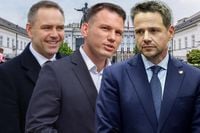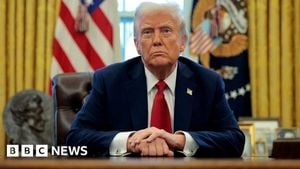As Poland gears up for its presidential elections set for May 18, 2025, the political landscape is taking shape with a diverse array of candidates vying for the highest office in the land. The National Electoral Commission (PKW) has registered 44 election committees, with seven candidates officially confirmed as of March 27, 2025. Among them is Artur Bartoszewicz, a 51-year-old economist and academic, who has emerged as a notable contender with a detailed election program that promises significant reforms.
Artur Bartoszewicz, who resides in Warsaw, has a robust academic background, serving as a lecturer at the Warsaw School of Economics. His credentials include a stint on the Council of the National Center for Research and Development from 2020 to 2024, and a prolific output of 30 reviewed scientific articles along with over 100 expert opinions and reports focused on economic and financial analyses. His experience and expertise position him as a serious candidate in a crowded field.
Bartoszewicz's election program is ambitious, comprising 21 points organized into three thematic groups he refers to as "siódemki" or "sevens." The first group, titled "stop the politicization of the state," advocates for a new constitution that would introduce citizen vetoes and binding referendums. He also seeks to eliminate political party financing and impose accountability on politicians for their decisions. This proposal reflects a desire for a more direct democracy where citizens have a greater say in governance.
The second group addresses economic and demographic security. Bartoszewicz proposes demographic scholarships for every newborn child and aims to protect land ownership rights. He emphasizes the importance of producing essential goods such as weapons, medicines, and food within Poland, alongside preparing young people for practical life skills through education reforms.
His third set of proposals focuses on national pride, encapsulated in the theme "Poles as a great and proud nation." This includes initiatives to renew national symbols and the national anthem, promote patriotic education, and enhance civic rights. Bartoszewicz’s vision extends to the complete access to firearms for citizens and the ambitious notion of "rebuilding the Polish Empire," signaling a strong nationalistic sentiment.
As of now, the PKW has officially registered seven candidates for the presidency: Sławomir Mentzen, Grzegorz Braun, Rafał Trzaskowski, Artur Bartoszewicz, Karol Nawrocki, Adrian Zandberg, and Szymon Hołownia. Each candidate brings unique perspectives and policies to the table, reflecting the diverse political spectrum in Poland.
The registration process for candidates is ongoing, with a deadline set for April 4, 2025. To be officially recognized, candidates must gather at least 100,000 signatures of support. Recently, Magdalena Biejat and Joanna Senyszyn joined the race, submitting 419,000 and 150,000 signatures, respectively, showcasing the competitive nature of this election cycle.
Polling data from the Pollster Institute reveals that the race is heating up, with significant support for leading candidates. As of early March, Rafał Trzaskowski, the Mayor of Warsaw and candidate for the Civic Coalition (KO), leads the polls with 37% support. Sławomir Mentzen of the Confederation follows with 22%, while Karol Nawrocki, backed by the ruling Law and Justice party (PiS), garners 21%. These figures indicate a competitive landscape, particularly among the major political factions.
Looking ahead, the political atmosphere is charged as candidates ramp up their campaigns. The first round of voting will occur on May 18, 2025, with a potential second round scheduled for June 1 if no candidate secures over 50% of the votes. The coming weeks will be crucial as candidates engage voters through debates and outreach efforts, aiming to solidify their support.
The deadline for submitting election committees passed on March 24, 2025, with 53 notifications received by the PKW. However, nine applications were rejected, underscoring the stringent requirements for candidacy. The PKW's decision to reject these applications reflects the competitive nature of the electoral process and the high standards set for candidates.
As the campaign unfolds, the focus will be on how effectively candidates can mobilize their bases and address the pressing issues facing Poland. Economic stability, national identity, and governance reforms are likely to dominate discussions as voters consider their options.
With the elections approaching, the political stakes are high. The outcome will not only shape Poland's immediate future but also influence its long-term trajectory in the European landscape. Will the electorate opt for continuity, or will they embrace change? The answer will emerge as the candidates continue to present their visions and the public weighs their choices.
As Poland prepares for this pivotal moment in its democratic process, citizens are encouraged to engage with the candidates and consider the implications of their votes. The upcoming months promise to be a defining period for the nation, with all eyes on the unfolding electoral drama.






